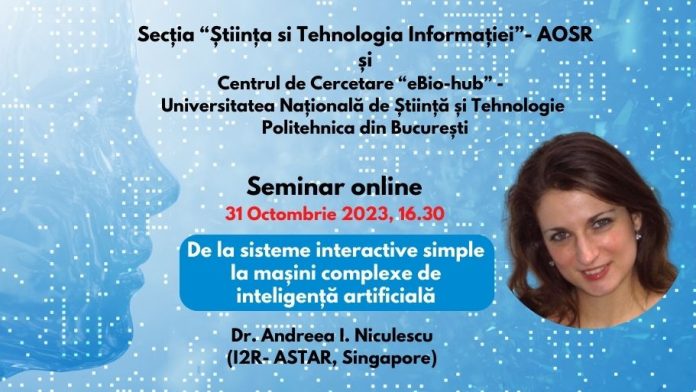The “Information Science and Technology” Section – Academy of Romanian Scientists and the “eBio-hub” Research Centre of the National University of Science and Technology of Bucharest invites you on
31 October 2023, 16.30, at the webinar
“From simple interactive systems to complex artificial intelligence machines: about the importance of understanding user needs, perceptions and context of use when designing for human experiences – a story of the Romanian researcher working in Singapore” – Dr. Andreea I. Niculescu (I2R-ASTAR, Singapore).
To participate, click HERE for the webinar link.
In our technology-driven world, we often feel frustrated when our technology experiences fall short of expectations. The culprit? Often a design flaw. This underscores the critical importance of understanding users’ needs, their unique perceptions, and most importantly, the context of use when it comes to software design. These elements collectively ensure that technology fulfils its primary purpose: improving human experiences. In my next talk, I will explore these key topics, presenting some research projects related to Human-Computer Interaction (HCI) in which I have had the privilege of being involved, but also sharing the knowledge I have gained along the way, drawn from my experiences as a researcher working at the intersection of different cultures and perspectives. I look forward to exploring the fascinating journey of developing smart cars for everyday use, all rooted in a deep understanding of users and their evolving contexts.
Andreea I. Niculescu works as a researcher in the Human Language Technology Department (Dialogue Technology Group) -A*STAR-Institute for Infocomm Research Singapore. Her main interests are in AI, UX and interaction design, focusing on developing user interfaces for speech, language and multimodal interactions. She studied Computer Science and Linguistics in Germany at Ruhr-University Bochum and did her PhD in the Netherlands at the University of Twente. Her thesis was on Conversational Interfaces for Task-Oriented Dialogues with Computer Systems. Andreea is a passionate advocate for social empowerment, sustainability and education through technology adoption.


